“Why don’t I love myself”?
This question highlights the common struggle most people face in their lives. There are different causes of not loving oneself including past trauma, negative self-perceptions, societal pressures, or unhealed emotional damages. Identifying these causes is imperative for fostering self-love.
Self-love goes beyond just a fancy word; it is one of the essential aspects of our well-being. However, many of us still struggle with it. We often question our value, criticize our flaws, and find it hard to accept ourselves fully. This comprehensive guide will look into the reasons behind self-hatred, offer practical steps to foster self-love and show how it can positively change our lives.
1. Understanding Self-Love
What Is Self-Love?
Self-love refers to accepting and valuing ourselves just as we are. It is about identifying our worthiness and embracing our imperfections as well as our inherent value as human beings. When we love ourselves, we become kind, compassionate, and respectful towards ourselves.
Why Is It Important to Love Yourself?
Loving yourself is not selfish; in fact, it is imperative for overall well-being.
- Mental Health: Self-love improves our mental health by reducing anxiety, depression, and stress. When we acknowledge our strengths and accept our weaknesses, we become emotionally strong.
- Physical Health: Research also highlights that self-love has a positive impact on our physical health by boosting our immune system, reducing inflammation, and even promoting longevity.
- Relationships: When we love ourselves, we establish strong boundaries and communicate more effectively about our feelings. This helps strengthen our relationships with others.
2. Signs You Don’t Love Yourself
- Negative Self-Talk: Pay attention to the way you think about yourself inside your mind. If you find yourself continuously criticizing or questioning yourself, then try to ignore those thoughts and replace them with kinder ones.
- People-Pleasing: If you constantly put others’ needs ahead of your own, it may indicate that you don’t love yourself. Keep in mind that self-care isn’t selfish but a necessity.
- Perfectionism: Trying to be perfect and flawless all the time is exhausting. Try to embrace and accept your imperfections as they are part of being human.
- Avoiding Self-Care: When you constantly ignore your well-being in terms of physical, emotional and mental, it indicates a lack of self-love. It is pivotal to prioritize to ensure your overall well-being.
- Fear of Vulnerability: Self-doubt or lack of self-love often leads to fear of being authentic and open. It is important to allow yourself to be honest and express your feelings openly.
3. Reasons Why You Don’t Love Yourself
- Past Trauma: Self-love might be hindered by unhealed emotional wounds from the past. Traumatic experiences might make you feel unworthy or guilty.
- The Influence of Family Environment: The family environment can significantly impact our emotional health. Family support provides us with a sense of security and belonging. On the contrary, growing up in less supportive and high-conflict families might lead to a lack of self-love due to emotional scars and negative thoughts. Such a toxic family environment can cause additional stress, conflict, and health issues.
- Comparison Trap: In today’s world of social media, we often compare ourselves with others. This constant comparison makes it challenging to accept ourselves as we are and might lead us to feel imperfect.
- Cultural Norms: Societal expectations and cultural norms play a significant role in defining what is considered beautiful, attractive, successful, or acceptable. When we do not fit into these standards, we may feel unworthy of love.
- Gender Roles: Gender stereotypes play an important role in shaping our thoughts about ourselves. Men and women experience different types of pressures, that significantly impact their self-image.
- Social Media Influence: The perfect lives we see on social media give the wrong idea of reality. Unrealistic standards set by influencers and celebrities make us feel unworthy and imperfect.
4. Why We Have to Love Ourselves
- Emotional Resilience: Self-love boosts self-esteem and helps us to cope with tough situations. You respond to the challenges with grace and resilience.
- Relationships: Self-love strengthen relationships. You build better and healthier connections with others and nurture the already existing connections.
- Life Satisfaction: Self-love makes you feel satisfied and happy in your life. It improves every aspect of your life, from your career to your personal life.
To learn or understand more about How to Love Yourself, watch the video below:
In this video, Jen Oliver discusses ways to love yourself. She is the author of the international best-selling book ‘The Love FitMama Way”, and creator of the FitMama Podcast.
5. How Do You Learn to Love Yourself?
Learning to love yourself is a continuous process. Given below are some actionable steps to guide you:
- Self-Reflection: Begin by reflecting on your beliefs and self-worth. Focus on the messages you have absorbed over the years i.e., from your childhood, society, and past experiences. If these messages are negative, challenge them and replace them with positive thoughts. This can enhance your sense of self-worth.
- Self-Care: Your well-being must be your priority. Make sure to get adequate rest, nourish your body with nutritious food, and engage yourself in regular physical activity.
- Positive Affirmations: Use affirmations to change the way you think. Repeat positive statements about yourself daily. For instance:
- “I deserve love and acceptance.”
- “I embrace my uniqueness.”
- “I am enough just as I am.”
- Mindfulness: Develop the habit of living in the present and being nonjudgmental toward yourself. Mindfulness helps you observe your thoughts without judging them. It enables you to respond to your inner thoughts with kindness and compassion.
To gain an in-depth understanding of Mindful Living read: Life Awakening: Mindful Living Journey
6. Role of Self-Esteem in Self-Love
- Healthy Self-Esteem: Self-love and self-esteem are interconnected. Strong self-esteem leads to self-acceptance, self-compassion, and recognizing your worth.
7. How Loving Yourself Changes Your Life
- Confidence: Self-love enhances confidence. When you accept your strengths and your flaws, you naturally show more self-assurance.
- Boundaries: Loving yourself gives you the power to set healthy boundaries that are beneficial for you. You recognize what you deserve and communicate clearly about your needs.
- Authenticity: Self-love enables you to live authentically. You no longer need to pretend or hide your true self.
8. Practical Self-Love Practices
Here are some practices on how to prioritize yourself:
- Prioritize Sleep: Quality sleep refreshes your body and mind. Set a calming bedtime routine and make sure to get adequate rest.
- Nutrition: Eat balanced meals to nourish yourself. Food has a significant impact on your physical health, as well as your mood and energy levels.
- Physical Activity: Regular exercise reduces stress and helps you relax. Find any physical activity that interests you, whether it is yoga, dancing, or walking.
- Mindfulness and Relaxation: Engage in mindfulness meditation or deep breathing exercises. These techniques help reduce anxiety and promote self-awareness.
- Affirmations and Positive Self-Talk: Our inner thoughts shape the way we see the world. Use positive affirmations to train your thoughts:
– “I deserve love and kindness.”
– “I embrace my uniqueness.”
– “I release self-judgment.”
9. Seeking Professional Help
- Therapy and Counseling: Consider seeking help from a therapist or counsellor. They can assist you in self-discovery, healing from past experiences, and building self-love.
- Breaking Stigma: It is necessary to view seeking help from a therapist or counsellor as something normal and acceptable. Therapy is not a sign of weakness; in fact, it is a courageous step toward growth.
Remember, loving yourself isn’t being selfish, it is a gift you give to both yourself and others.
 Frequently Asked Questions (FAQs) about Self-love
Frequently Asked Questions (FAQs) about Self-love
1. What is the cause of not loving yourself?
There are different causes of not loving oneself. It could be because of past trauma, negative self-perceptions, societal pressures, or unhealed emotional damages. Identifying these causes is imperative for fostering self-love.
2. What is it called when you don’t love yourself?
When someone finds it hard to self-love, it is often referred to as “self-hatred” or “low self-esteem.” These feelings can significantly affect mental and emotional well-being.
3. Is it bad if you don’t love yourself?
Lacking self-love can adversely impact overall well-being. It may lead to anxiety, depression, and toxic relationships. Prioritizing self-love is pivotal for personal growth and satisfaction.
4. Is there a disorder for not loving yourself?
There isn’t a specific mental disorder exclusively related to self-love; however, conditions such as depression, anxiety, or low self-esteem often involve struggling to feel valuable or worthy. In such a situation, it is essential to seek professional help.
5. How do I like myself again?
- Self-Reflection: Understand your beliefs about yourself and replace negative thoughts with positive ones.
- Self-Care: Give priority to your well-being.
- Positive Affirmations: Use positive affirmations to train your mindset.
- Seek Support: Seek help from a therapist or counsellor.
6. Is self-love selfish?
No, loving yourself isn’t selfish. It is pivotal for mental, emotional, and physical health. When you take care of yourself, you can care for others.
7. How do I deal with negative self-talk?
Counter your negative thoughts by asking yourself: “Would I say this to a friend?” If not then replace that harsh self-criticism with kind, and more supportive language.
8. Can self-love coexist with self-improvement?
Absolutely! Self-love doesn’t mean a lack of self-improvement. It involves accepting yourself while striving to become. It means embracing your imperfections while working toward positive changes.
References
- 6 Ways To Practice Self-Love. (2024, May 28). Forbes. https://www.forbes.com/health/mind/how-to-practice-self-love/
- Neff, K. (2003). Self-compassion: An alternative conceptualization of a healthy attitude toward oneself. Self and identity, 2(2), 85-101.
- Brown, B. (2022). The gifts of imperfection: Let go of who you think you’re supposed to be and embrace who you are. Simon and Schuster.
- Rosenberg, M. (2015). Society and the adolescent self-image. Princeton University Press.
- Fredrickson, B. L., & Roberts, T. A. (1997). Objectification theory: Toward understanding women’s lived experiences and mental health risks. Psychology of Women Quarterly, 21(2), 173-206.
- Luvira, V., Nonjui, P., Butsathon, N., Deenok, P., & Aunruean, W. (2023, January). Family Background Issues as Predictors of Mental Health Problems for University Students. In Healthcare (Vol. 11, No. 3, p. 316). MDPI.

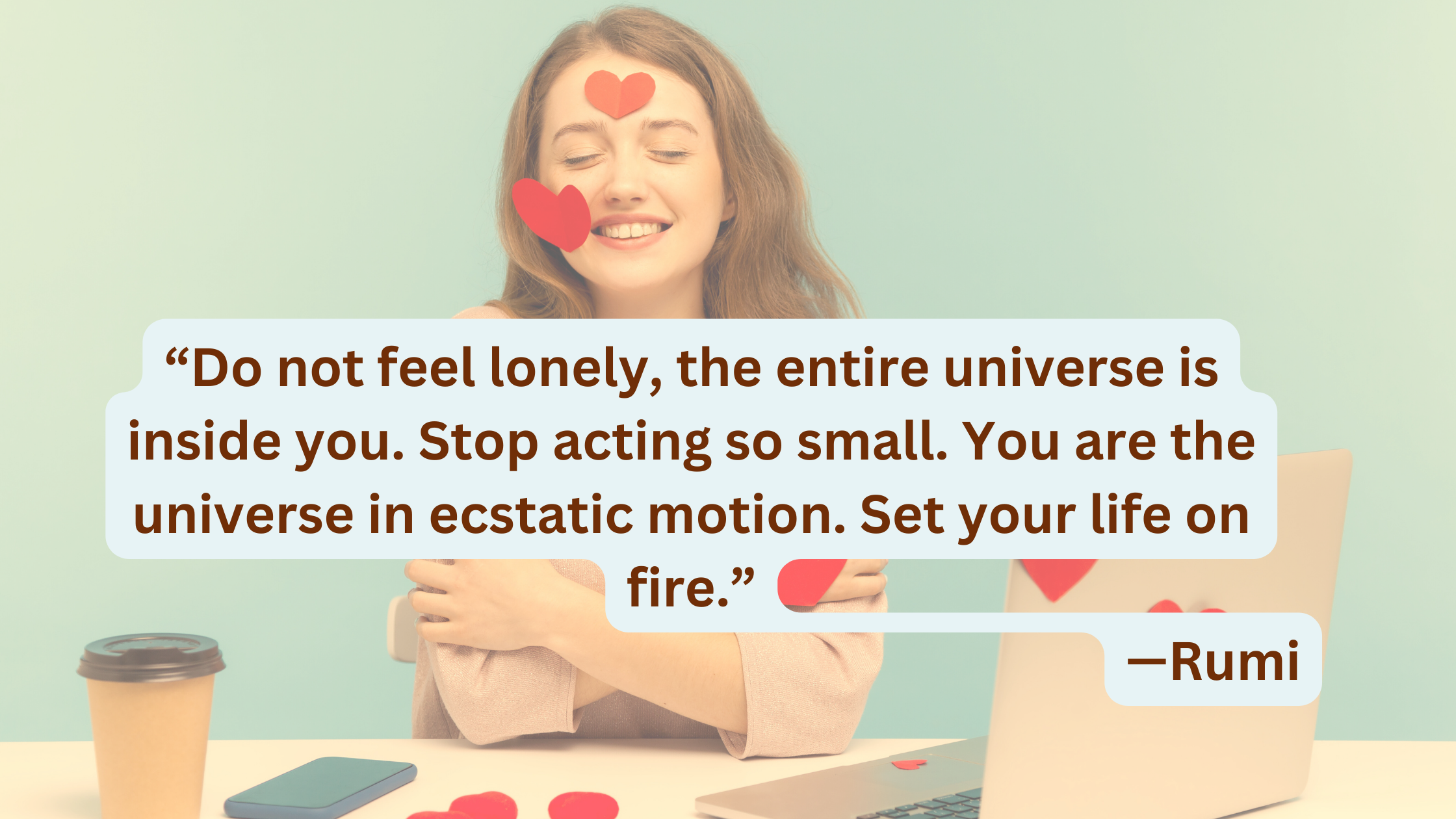
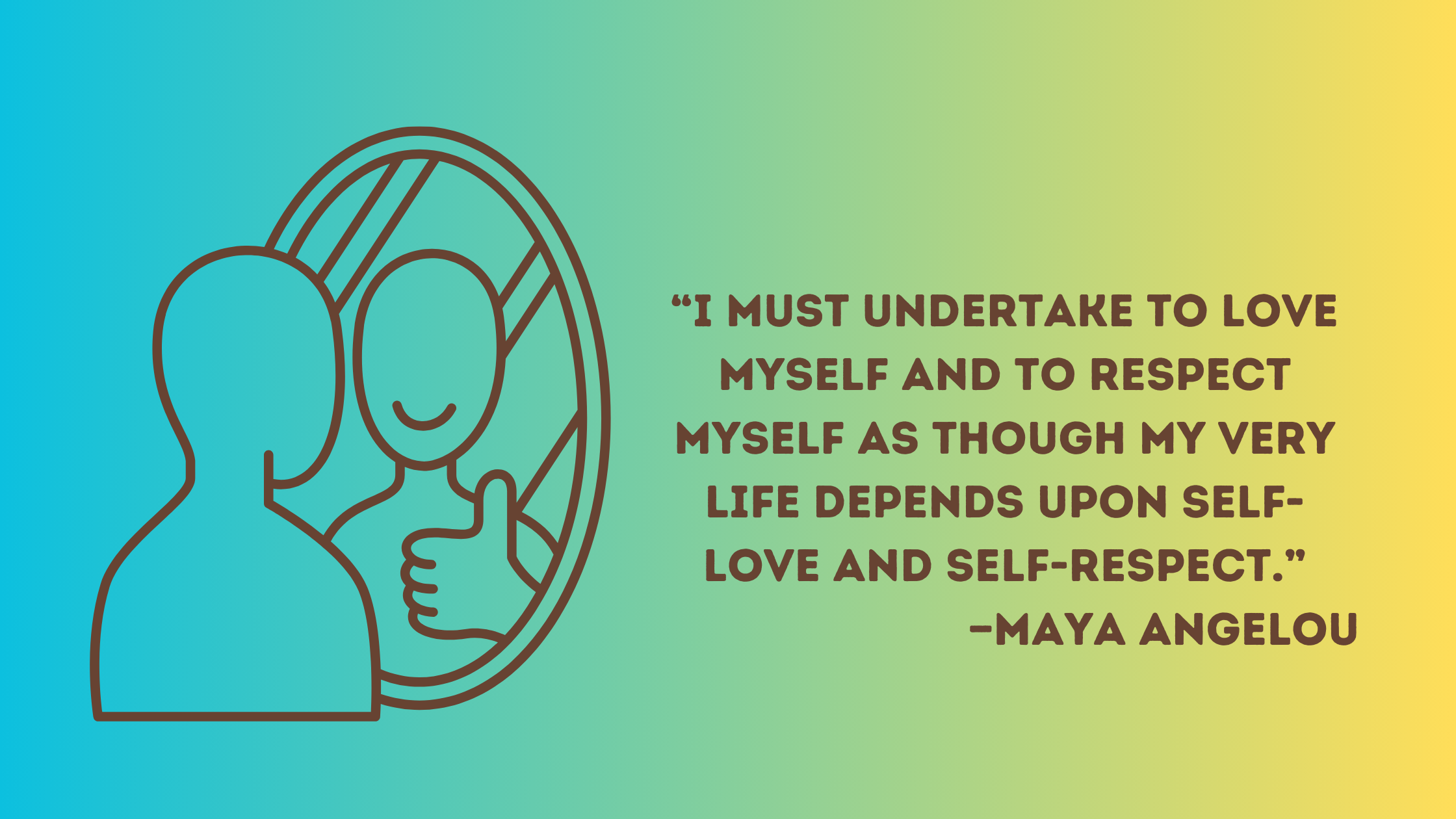
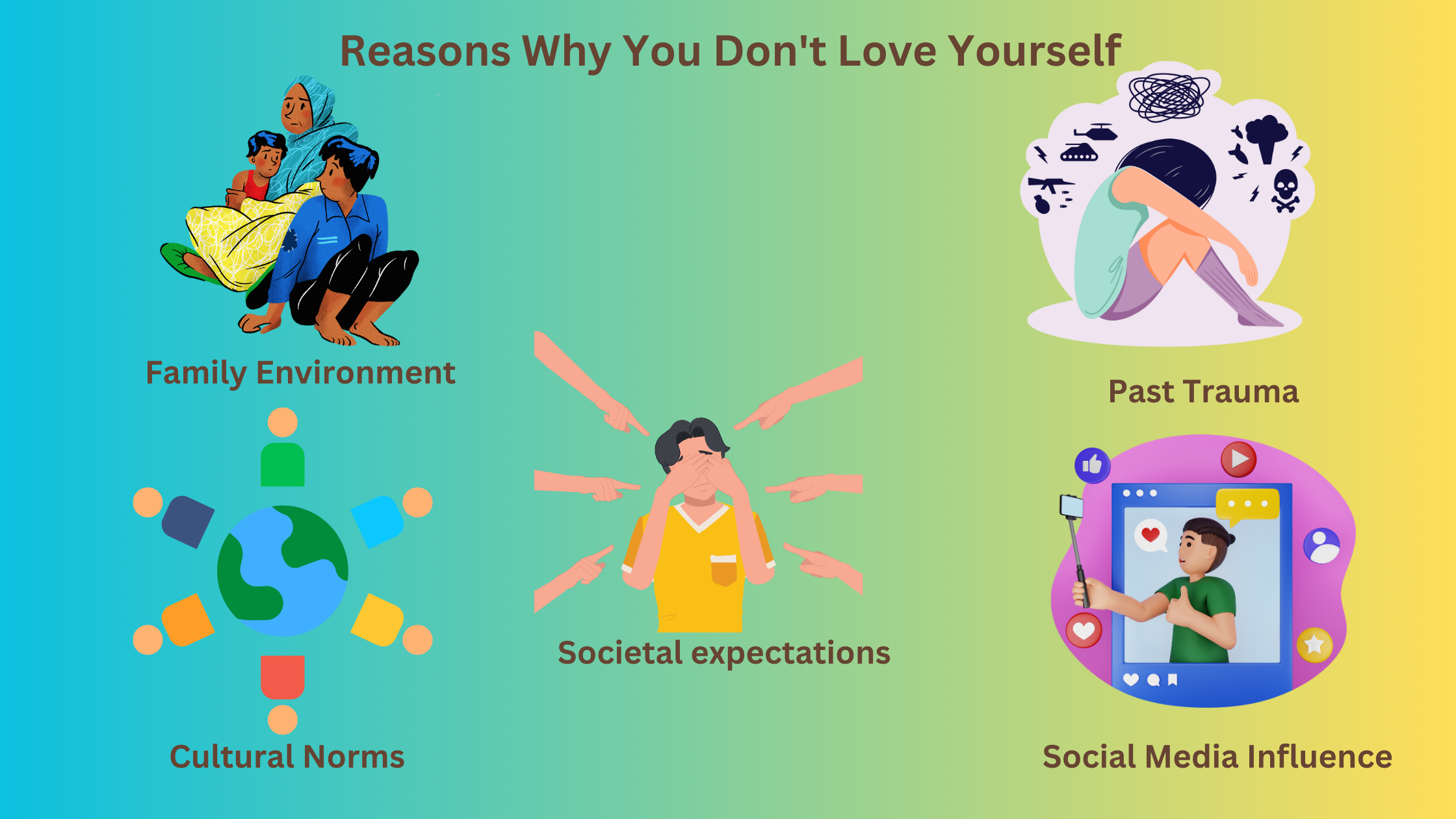

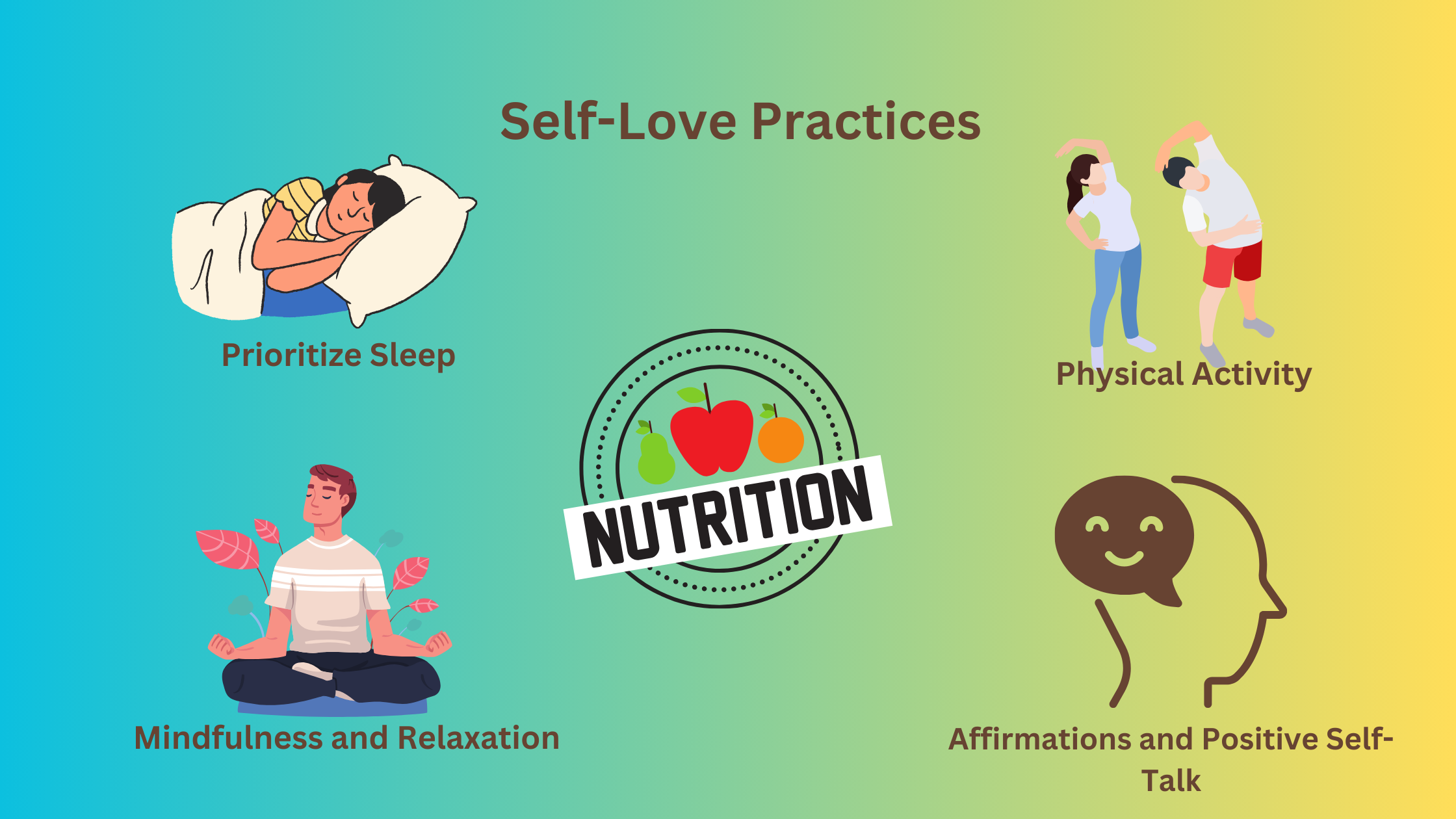
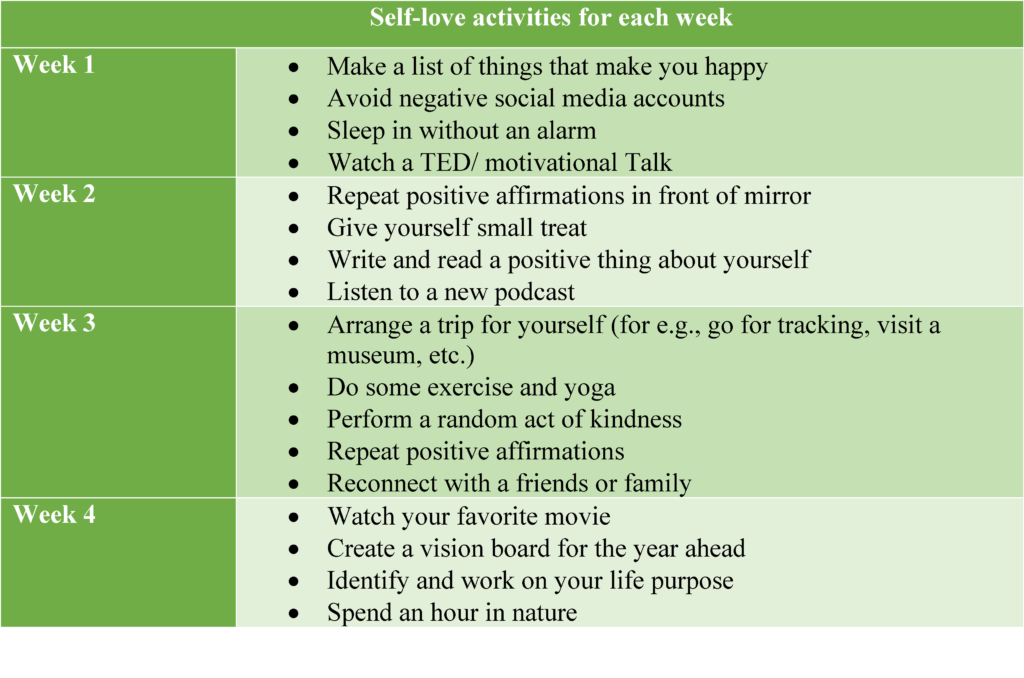 Frequently Asked Questions (FAQs) about Self-love
Frequently Asked Questions (FAQs) about Self-love